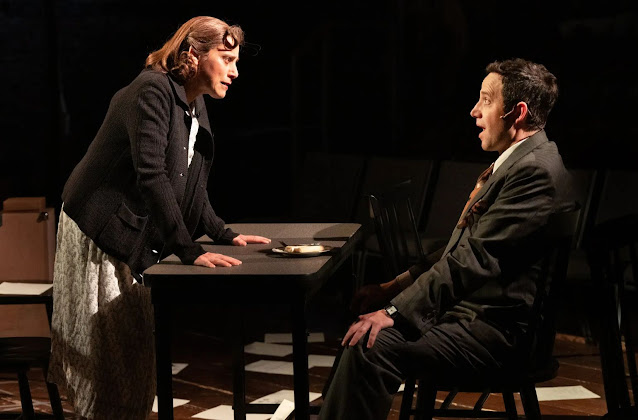 |
| Judy Kuhn and Santino Fontana in I Can Get It for You Wholesale. (Photo: Sara Krulwich) |
The composer-lyricist Harold Rome, who died in 1993, has been more or less
forgotten, but he was one of the few Broadway songwriters who wore his
leftist politics on his sleeve. He broke through in a 1937 revue called
Pins and Needles that focused on the uneasy relationship
between management and labor and was produced by the International Ladies’
Garment Workers’ Union, whose members performed the sketches and musical
numbers. How it managed to move from a tiny studio above the Labor Stage
(the former Princess Theatre) to a Broadway house is something of a
mystery, but counting all three editions, it ran for more than three years
and made Rome’s reputation. His career spanned more than three more decades.
A few of his shows were successful: the 1946 revue
Call Me Mister,
about returning servicemen; Wish You Were Here (1952), an
adaptation of the Arthur Kober play Having Wonderful Time,
set at an adult summer camp in the Catskills; Fanny (1954),
based on a trilogy of French romantic dramas by Marcel Pagnol; and
Destry Rides Again
(1959), with Andy Griffith and Dolores Gray taking the roles played
famously by Jimmy Stewart and Marlene Dietrich in the 1939 picture, a
hybrid western-romantic comedy. (Destry Rides Again was
the first show I saw on Broadway, when I was eight.) Until this season the
only one that has been revived in New York, to my knowledge, is
Fanny, which made it onto an Encores! slate in 2010 and proved to be just as
bland and unmemorable as the original cast album indicated. It would be fun
for someone to mount Wish You Were Here, which contains
some lovely songs; Eddie Fisher made the hit parade with his recording of
the title song. But don’t get your hopes up: in the original version the
director, Joshua Logan, and the designer, Jo Mielziner, flooded the
orchestra pit to create a swimming pool, which made even a pre-Broadway
tryout tour impossible.
After the one-of-a-kind Pins and Needles, Rome’s most
interesting musical was I Can Get It for You
Wholesale (1962), which Jerome Weidman culled from his 1939 novel
about life in Manhattan’s garment district. If musical theatre mavens know
it at all, it’s for introducing Barbra Streisand, who played the
indispensable secretary of the show’s protagonist, Harry Bogen, and brought
down the house with her big number, “Miss Marmelstein.” (Bogen was played
by Elliott Gould, nearly a decade before Robert Altman made him a movie
star in M*A*S*H; Gould became Streisand’s first husband.
And Streisand was among the singers who made the only recording of the
score for Pins and Needles the same year, to honor the
twenty-fifth anniversary of its premiere.) Perhaps Trip Cullman’s
sharp-edged, sharp-witted production of Wholesale for
Classic Stage Company, which closes December 17, will have the effect of
bringing a woefully neglected musical to light. Weidman’s son John, who
wrote the books for three of Stephen Sondheim’s shows – including, in this
critic’s opinion, his finest, the 1975 Pacific Overtures –
has reworked the original book, and never having read the original I can’t
say how much he’s altered it. One change I could deduce by looking at the
1962 playbill online: he’s added an opening episode with real punch that
dramatizes Harry’s first bitter experience of the tough (and anti-Semitic)
New York streets, which, at about thirteen years of age, he has to navigate
while delivering goods for garment manufacturers. Weidman, Cullman and the
inventive choreographer, Ellenore Scott, have initiated this section with a
dance number featuring the talented young dancer Victor de Paula Rocha as
the young Harry and ended it with Judy Kuhn as Mrs. Bogen introducing the
song “Eat a Little Something,” which didn’t appear until late in the second
act in the original production. In this iteration that version of the song
is a reprise, sung to Santino Fontana as the grown-up Harry.















,Michael%20Kaye,%20and%20Rom%20Barkhordar%20(far%20right).jpg)



